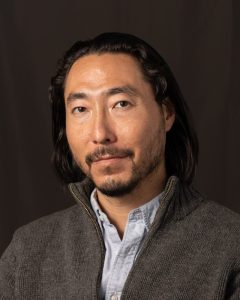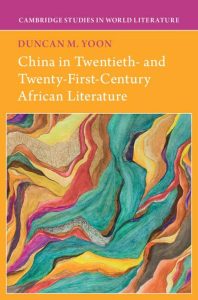On the 9th of November, DePauw was fortunate enough to welcome a returning alumni, Duncan Yoon, PhD, to speak. Now teaching at the NYU Gallatin School of Individualized Study, Yoon seeks to explore the intersections of language, race, geography and identity in his new book, China in 20th and 21st Century African Literature (2023). The 2020 manuscript won the American Comparative Literature Association’s Helen Tartar First Book Subvention Award, and Yoon himself has past served as both a Fulbright Scholar and Kluge Fellow. Thursday’s presentation focused on the contents of the book, exploring each chapter’s unique foundation in a given genre of select African literature. Yoon supports his core argument with his other research, which includes his own travels to various parts of Africa including Ghana and South Africa. Ultimately, Yoon’s

work challenges conventional stereotypes of Africa-China relations, and presents a much more heterogeneous perspective on international politics and identity.
Rejecting Western Stereotyping
Yoon begins his book by outlining what he sees as the catalyst for modern Western stereotyping. Pulling from Kofi Awoonor’s collections of poetry, Yoon highlights key events such as Afro-Asian Cold War solidarity and later forums confirming cooperation between both parties. He asserts that, as a result, European and American media report on Africa-China relations from an exclusively political perspective, and often create a homogenous colonial narrative where Africa is a victim of Chinese exploitation. Much of Yoon’s research rejects this idea and instead finds parallels in thinking between Africa and China rather than predatory practices. Yoon again uses African literature to demonstrate these similarities, using Awoonor’s poetic comparison of the Red Army’s 1935 Long March to pan-African decolonization. Yoon also underscores that Awoonor held political beliefs aligning with socialist and communist rhetoric, further drawing comparisons between China and Africa.
To better explore Western media sensationalism and colonial interpretations of Chinese-African relations, Yoon turns away from poetry and dives into genre fiction. In the second section of the book, novel quotations pair with Africa’s mining history, developing an image of what Yoon refers to as “extractivism.” The literal excision of earth’s resources, on African soil but in many cases involving Chinese companies, serves as an easy metaphor for aggressive modern colonialism. Yoon elaborates that “mining becomes the site of this extraction, but also becomes an important symbol for understanding the relation between the two entities.” He argues that the relationship is more complicated than simple exploitation and uses his associated pieces of genre fiction to investigate who is exactly responsible. At the same time, Yoon realizes that Chinese mining operations still catalyze “colonial trauma,” and is careful not to e
xonerate any given party completely. Instead, the book adopts a deeply personal lens, using literary protagonists to assess the impact on African citizens in reference to the mining industry and its affiliates. At the intersection of these economic and personal motives is “resource nationalism: anything that happens to gold also happens to Ghana.” Yoon articulates how personal sentiments and living conditions connect with larger social and economic structures and outlines how severely exploitation can impact peoples’ lives.
Intersecting Identities
From this budding consideration of personal perspectives, Yoon switches his focus to memoirs and uses the third section of his book to more directly explore the state of individuals in a community. In the presentation, he described this section as his “favorite chapter,” and uses memoirs to “take up the question of diaspora.” Economic elements now focus on specific people and their situations, shedding light on the specific hardships and progress made in regards to identity and mob

ility. Many of Yoon’s literary protagonists in this section are “figures of risk, embodied by the gambler.” Cultural and financial instabilities predicate a volatile environment that necessitates risk-taking, even as it punishes its constituents. Through the lived experiences of each memoir, Yoon argues that “it’s a gamble to travel for work [and] education.” This uncertainty impacts the mobility central to Yoon’s exploration of the Afro-Chinese diaspora and identity, creating a shifting image of travel that’s hard to trace.
The final chapter of the book focuses specifically on Afro-Chinese identity, relying on Henri Lopes’s Le lys et le flamboyant (1997). Both the book and Yoon’s presentation cultivate an image of social contradiction, where multiple identities both merge and clash with one another. This image rejects what Yoon views as a Western racial framework, and he argues that “racial classifications emerged out of European imperialism,” and that these Western perspectives “often circulate as universal givens.” Ultimately, Yoon argues that the truth is less clearly defined than what the common narrative would argue, with nuances in politics and identity playing a critical role for all affected persons. The book references Maoist guerillas clashing with a Congolese Marxist-Leninist state, at a time that Yoon describes as when “Mao in the Congo became a barometer for how revolutionary you are.” He uses this conflict and other moments in literature and history to confirm his previously proposed parallels between Africa and China, demonstrating just how deep the intersections between the two cultures can be.
The Alluvial
Rather than attempt to create a universal truth from this combination of different nationalities and cultures, Yoon embraces the concept of the alluvial, referring to a type of fertile soil that sits on riverbeds. The conclusion focuses on “explicit consideration of literary form,” using Yvonne Adhiambo Owuor’s The Dragonfly Sea as a framework for “a creolization by climate.” Both the physical land and the identities of those that travel and settle there create a rich culture that, Yoon argues, cannot be described as entirely African or entirely Chinese, nor separated into its constituents. The powerful climate imagery in the book highlights this intersection, using symbols of waves, shorelines and the natural world to underscore its arguments of chaotic unity. Owuor’s “dichotomy between interiority and exteriority” rejects colonial pressure to assimilate into one framework and instead embraces a fractal, multitudinous identity that defines itself through mutability and paradox.
At the beginning of his presentation, Yoon described a moment during his time in Africa where he stayed in an area being “slowly reclaimed by the ocean”. In this liminal space, he was able to create an image for his argument, with old culture being slowly consumed and combined into something new. He describes it as “a prophetic space where things are washed up…things you have to explain.” Through these accumulations of experiences, identities and lives, Yoon paints a powerful picture of a detailed and well-realized diaspora and culture.